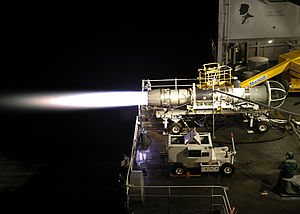
The General Electric F404 and F412 are a family of afterburning turbofan engines in the 10,500–19,000 lbf (47–85 kN) class (static thrust). The series are produced by GE Aviation. Partners include Volvo Aero, which builds the RM12 variant. The F404 was developed into the larger F414 turbofan, as well as the experimental GE36 civil propfan.
GE developed the F404 for the F/A-18 Hornet, shortly after losing the competition for the F-15 Eagle's engine to Pratt & Whitney, and losing the Lightweight Fighter (LWF) competition to the Pratt & Whitney F100 powered YF-16. For the F/A-18, GE based the F404 on the YJ101 engine they had developed for the Northrop YF-17, enlarging the bypass ratio from .20 to .34 to enable higher fuel economy. The engine was designed with a higher priority on reliability than performance. Cost was the main goal in the design of the engine.
GE also analyzed "throttle profiles" and found that pilots were changing throttle settings far more often than engineers previously expected; putting undue stress on the engines. GE also sought with the F404 a design that would avoid compressor stalls and other engine failures, and would respond quickly to control inputs; a common complaint of pilots converting from propeller planes to jets were that early turbojets were not responsive to changes in thrust input. GE executives Frederick A. Larson and Paul Setts also set the goal that the new engine would be smaller than the F-4's GE J79, but provide at least as much thrust, and cost half as much as the P&W F100 engine for the F-16.